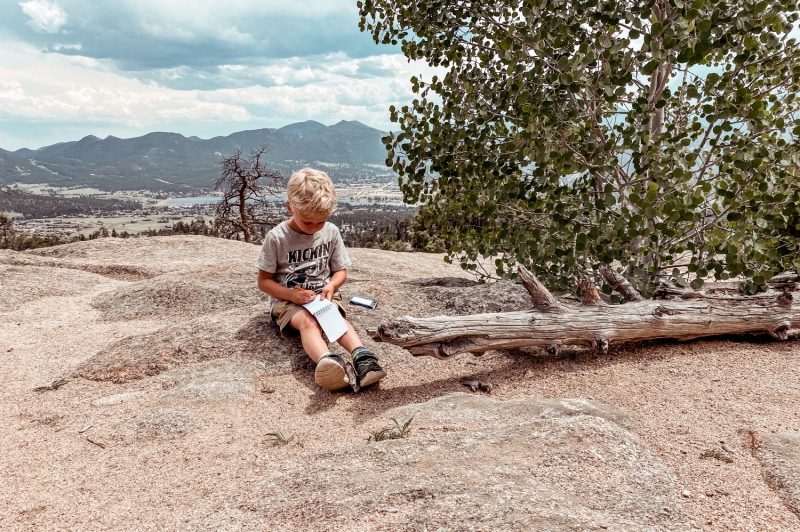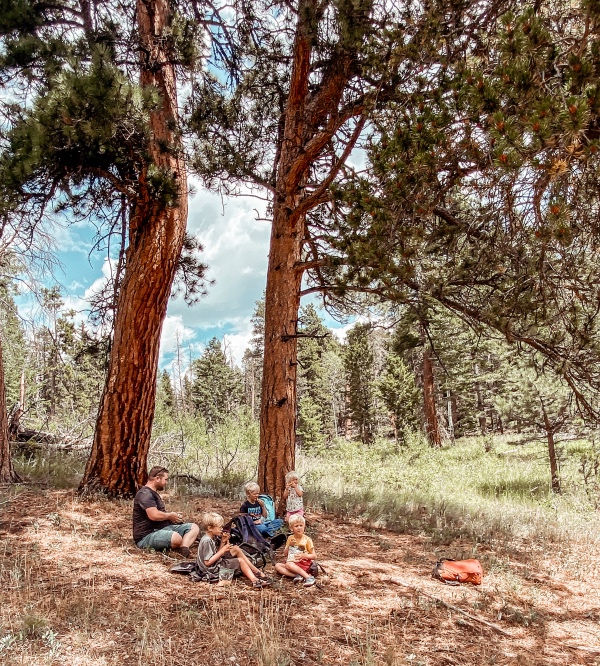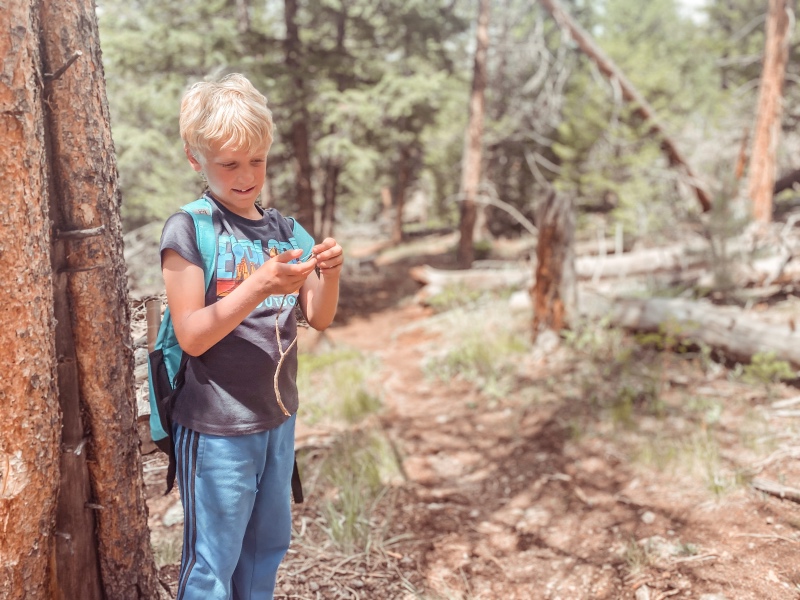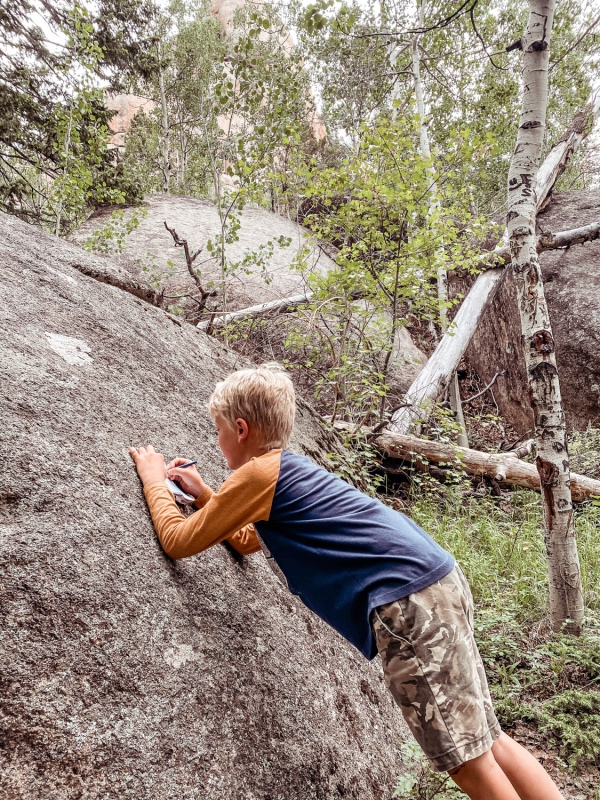5 Ways to Inspire Your Child in Bible + Nature Journaling
The Nature of Rest
What the Bible and Creation Teach Us About Sabbath Living
Intentional Parenting
Nature Studies
Apologetics
Adventure
Free Resource
Entrepreneurship
Homeschooling
Faith
Books
Categories
Master Naturalist, Bible teacher, author, wife, and mama of four! Join our adventures of discovering God while adventuring in creation.
I'm Eryn
Hey there!
Listen Now
Order now

“What would you call them?” My husband posed the question to our son, “If someone had never seen a grasshopper, how would you describe one to them?”
John Muir’s Wilderness Essays laid sprawled across my lap, the words lit by the string lights hanging from our back patio. Their glow grew more powerful as night fell around us. Our boy thought.
“Chirpers of the night.” His answer was definite, as if he’d considered this question before — many times perhaps. I continued to read…
“In general views all the coast forests look dark in the middle ground and blue in the distance, while the foreground shows a rich series of gray and brown and yellow … May they be saved until wanted for worthy use—so worthy that we may imagine the trees themselves willing to come down the mountains to their fate!”

My boy writes in the notebook splayed before him, taking in words from the book in my lap, and chatter from the crickets resounding in the grass. His descriptions have grown in tandem with his vocabulary, but I believe the strongest factor is his attention. “I call them snow lizards,” he told us once from the backseat as we watched flurries of white snow swept across the street by the wind. Snow lizards. I’ve never once thought snow flurries different since.
“Everything they describe comes from their context,” I remarked to my husband one day. They take what they know — what they have tasted, touched, smelled, heard, and laid eyes upon — and when encountered with something new, they turn over the details of what is familiar. They sift through what they recognize until at last, they can form into words what they’re beholding for the first time.

In this way, their world grows. As it does, their faith follows suit. I have observed this in my son, as he begins connecting dots between nature and his Creator. “Mom, water is what most reminds me of God,” he told me one afternoon, “because water is in everything alive.” Perhaps, with this tangible context, he’ll better soak in Jesus’ words, such as those in John 4:11, “’Whoever drinks of the water that I will give him shall never thirst; but the water that I will give him will become in him a well of water springing up to eternal life.’”
Once in a while, my children’s descriptions feel rushed. I challenge them to dig one layer deeper, one more corner back in the thesaurus of their minds. Pursue that word you do not use much, the hidden word, that concept or picture that might fit just right, or at least be one step closer to it.

The late educator Charlotte Mason presents a scene such as this in The Outdoor Life of Children. She presses for an exertion of observation. The little one who comes to his mother and “fails to make it clear whether he is describing an elm or a beech, should get no encouragement; not a foot should his mother move to see his tree, no coaxing should draw her into talk about it, until, in despair, he goes off and comes back with more certain note—rough or smooth bark, rough or smooth leaves,—then the mother considers, pronounces, and, full of glee, he carries her off to see for himself.” Charlotte Mason explains this tactic in that the mother is “training their powers of observation and expression, increasing their vocabulary and their range of ideas … and she is training her children in truthful habits, by making them careful to see the fact and state it exactly, without omission or exaggeration.”
I want to train my children in observation, expression, and truthful habits. I want them to employ their childlike wonder and faith by glimpsing together the two revelations we are given of God: “General revelation,” referring to what we can see, touch, taste, smell, and hear — and “special revelation,” what we are given through His written Word. As our children start to see science and the natural world as the theology it is — a study of God’s character and love for us — they will begin to look at nature and, as German astronomer Johannes Kepler once stated, begin “thinking God’s thoughts after Him.”

5 Ways to Inspire Your Child in Bible + Nature Journaling
1. Inspire Words
Take your child outside and ask them to choose something natural they see. Ask them these questions:
- What do you think God was thinking about when He created this?
- What strengths did He give it?
- What details about God does it reflect?
If they have difficulty with this, help them choose another object (perhaps a flower, bird, or insect), and try again.
2. Collect Words
Give your child a special small notebook. Have them write on the cover, “Words I like.” Challenge them to build a collection of words, and to refer to their list every time they write. Encourage them to build their list by finding words from nature and the Bible.
3. Connect Words
Read the following Scriptures with your child. Begin with just one. Ask your child to tell you what words the writer used from nature, and why they think that specific image was used. Then ask them what the verse teaches them about God.
- Isaiah 40:8
- Psalm 104:13
- Psalm 90:2
- Psalm 1:1-3
Now have your child write a few sentences about something in nature they like, and what it shows them about God.
4. Give Words Time
Encourage your child to give words the time they need. Once they write something, challenge them to step away from that piece for one day. Have them come back to it the following day and ask them if they want to keep the words they have, or, after sitting with their thoughts for a day, swap any out.
5. Uphold the Word
This is the most important piece of Bible + Nature Journaling. As writers, we want to be those who are, as 2 Timothy 2:15 states, “accurately handling the word of truth.” Have your child practice using God’s Word as it was intended. Most study Bibles provide cross references in the margins that point verses to similar verses and lend context. You can also use tools like BibleGateway.com to look for connected biblical thoughts. Train your child to not pluck verses from the Bible and use them to make a point, but rather test it against itself and make sure their thoughts align with God’s and what is supported throughout Scripture. Here are some questions you can ask them:
- Is your thought true to God’s character? Do you see Him acting in this way throughout the Bible?
- Is your thought serving only ourselves (making people feel good), or is it serving God’s glory and bigger purpose (making us more like Him)?
- Does your thought point people to God?
- Do you feel like you are shoving a puzzle piece where it does not fit in order to get this point across? Maybe you can keep searching God’s Word, or we can find a different object from nature that will better communicate this thought.
learn more
Raising kids stirs something deep in our souls — an innate knowing that our time is finite. Taking my kids outside in creation, I’m discovering how to stretch our time and pack it to the brim with meaning. God’s creativity provides the riches of resources for teaching the next generation who He is and how He loves us. Join our adventure and discover inspiration and resources for refusing rush, creating habits of rest, living intentionally, and making the most of this beautiful life!
I'm Eryn, Master Naturalist, Author, & Bible Teacher
Hey there!
Receive free inspirational resources for refusing rush, creating habits of rest, parenting with intentionality, and teaching our kids who God is through what He has made!
Inspired
Be
Brand + Website by Amarie Lael Design | TERMS & CONDITIONS + PRIVACY POLICY | Copyright 2011 - 2026 Eryn Lynum
Contact
Speaking & media
About
Books
Shop
Videos & Interviews
Email List
Stories
Free Downloads
Resources
Home
@erynlynumauthor
The Nature of Rest
What the Bible and Creation Teach Us About Sabbath Living
Now Available!
Order
X
Signed Copy
I want to be homeschooled by you!! Your children are so blessed by your insights, teaching techniques, and spiritual leadership. What a great post!!
Awww, thank you Cindy!! Your encouragement always means so much to me.
What a treasure! I am a Charlotte Mason homeschooling mom and an artist/ lover of nature- you consolidated so well things have I have been thinking and working towards with my 4 kids… I love your practical step by step suggestions!
Thank you so much, Jane! That’s very encouraging to me 🙂 I’m a Charlotte Mason homeschooling mama too. I’m so glad you enjoyed this post!